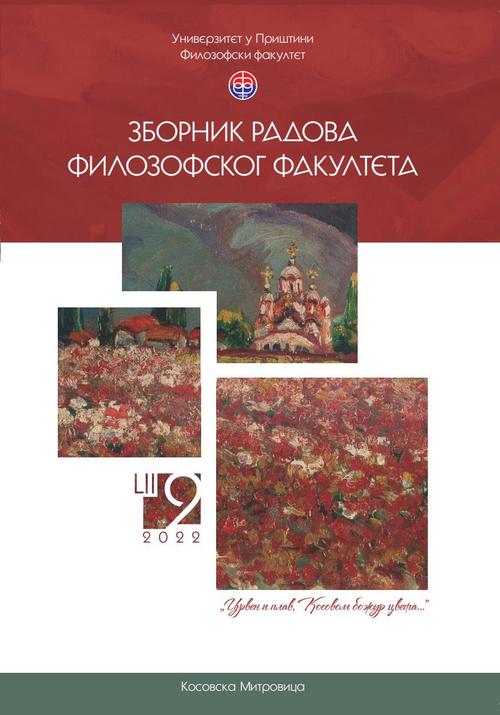Библиотерапија у школском контексту
Sažetak
Циљ библиотерапије је пружање помоћи читаоцу да кроз књигу разуме и преброди потешкоће са којима се се сусреће. Она се може примењивати у различитим контекстима. Уколико се примењује у школском окружењу, говоримо о развојној библиотерапији.
Циљ овог рада је да се опишу основне фазе развојне библиотерапије, представе резултати истраживања који указују на ефикасност њене примене, као и резултати истраживања који говоре о склоности наставника и сарадника да се определе за ову технику.
С обзиром на то да се ова техника сматра једноставном, економичном и ефикасном интервенцијом, а да се неки наставници и сарадници не усуђују да је примењују јер им недостају потребна знања и вештине, укључивање библиотерапије у факултетске програме обуке могло би допринети повећаној спремности професионалаца да је користе како би помогли деци да се суоче са изазовима на развојно примерен начин.
Reference
Митровић, Ј. (2013). Примена библиотерапије у школској библиотеци. Читалиште, 62–69.
Andreou, E., Paparoussi, M., & Gkouni, V. (2013). The Effects of an Anti-Bullying Bibliotherapy Intervention on Children’s Attitudes and Behavior. Global Journal of Arts Humanities and Social Sciences, 1 (4), 102–113.
Başarı, Ş. & Latifoğlu, G. (2021). Evaluation by Students of Bibliotherapy Technique Used in Group Guidance Activities. Laplage em Revista, 7 (2), 145–157.
Byrd, J. A., Washington, A. R., Williams, J. M., & Lloyd, C. (2021). Reading Woke: Exploring How School Counselors May Use Bibliotherapy with Adolescent Black Boys. Professional School Counseling, 25 (1c), 1–12.
Bland, C. M. (2013). A Case Study of General Education Teacher Use of Picture Books to Support Inclusive Practice in The Primary Grades of an Inclusive Elementary School (Doctoral dissertation). Greensboro: University of North Carolina.
Cameron, L. & Rutland, A. (2006). Extended Contact Through Story Reading in School: Reducing Children’s Prejudice Toward the Disabled. Journal of Social Issues, 62(3), 469–488.
Cameron, L., Rutland, A., Brown, R., & Douch, R. (2006). Changing Children’s Intergroup Attitudes Toward Refugees: Testing Different Models of Extended Contact. Child Development, 77 (5) 1208–1219.
Camp, R. D. (2015). Perceptions of Bibliotherapy: А Survey of Undergraduate Students. (Doctoral dissertation). Ames: Iowa State University.
Carlson, R. (2001). Therapeutic Use of Story in Therapy with Children. Guidance & Counselling, 16 (3), 92–99.
Coleman, M. & Ganong, L. H. (1990). The Uses of Juvenile Fiction and Self-Help Books with Stepfamilies. Journal of Counseling & Development, 68, 327–331.
Cook, K. E., Earles-Vollrath, T., & Ganz, J. B. (2006). Bibliotherapy. Intervention in School and Clinic, 42 (2), 91–100.
Forgan, J. W. (2002). Using Bibliotherapy to Teach Problem Solving. Intervention in School and Clinic, 38 (2), 75–82.
Goddard, A. T. (2011). Children’s Books for Use in Bibliotherapy. Journal of Pediatric Health Care, 25 (1), 57–61.
Heath, M. A., Sheen, D., Leavy, D., Young, E., & Money, K. (2005). Bibliotherapy: A Resource to Facilitate Emotional Healing and Growth. School Psychology International, 26 (5), 563–580.
Herbert, T. P. & Furner, J. M. (1997). Helping High Ability Students Overcome Math Anxiety Through Bibliotherapy. Journal of Secondary Gifted Education, 8, 164–179.
Hoffman, E. M., Marlowe, M. J., Scharf, K. H., Disney, G. H., Macer, A., Poling, D., & Queen, A. (2015). Using Torey Hayden’s Teacher Stories to Teach Relationship Skills in Special Education Teacher Preparation. Teacher Education Quarterly, 42 (2), 65–85.
Hubin, A., De Sutter, P., & Reynaert, C. (2011). Bibliotherapy: An Effective Therapeutic Tool for Female Sexual Dysfunction?. Sexologies, 20 (2), 88–93.
İlter, B., Leana-Taşcılar, M. Z., & Saltukoğlu, G. (2018). The Effects of the Bibliotherapy Technique on Perfectionism Levels in Gifted Children: An Experimental Study. European Journal of Education Studies, 4 (2), 153–176.
Kingsley, N. E. (2017). Effectiveness of Role Play and Bibliotherapy in Attitude Change of Primary School Pupils Towards Learners with Special Needs in Nigeria. Disability, CBR & Inclusive Development, 27 (4), 93–105.
Klarić, M. (2013). Terapeutske priče u inkluzivnim skupinama iz perspektive odgajatelja (završni rad). Rijeka: Sveučilište u Rijeci, Učiteljski fakultet.
Lea, B. (2015). Children’s Books About Special Needs Used as a Mediating Tool, the Perceptions of Inclusion Classroom Teachers in Mainstream Schools. Higher Education Studies, 5 (1), 51–62.
Lipschultz, H. (2012). Bibliotherapy: A Literature Review, 1–13. Retrieved from: http://hollythelibrarian.com/wp-content/uploads/2012/10/Bibliotherapy-literature-review.pdf
Maich, K. & Kean, S. (2004). Read Two Books and Write me in the Morning: Bibliotherapy for Social Emotional Intervention in the Inclusive Classroom. Teaching Exceptional Children, 1 (2), 5–11.
Marlowe, M. & Maycock, G. (2001). Using Literary Texts in Teacher Education to Promote Positive Attitudes Toward Children With Disabilities. Teacher Education and Special Education, 24 (2), 75–83.
Marković, A. S. (2015). Razvojna biblioterapija u kontekstu potreba savremenog deteta. Sinteze, 7, 53–70.
Olsen, M. A. (2006). Bibliotherapy: School Psychologists’ Report of Use and Efficacy (Doctoral dissertation). Provo: Brigham Young University.
Pardeck, J. A. (2014). Using Books in Clinical Social Work Practice: A Guide to Bibliotherapy. Routledge.
Pardeck, J. T. (1993). Literature and Adoptive Children with Disabilities. Early Child Development and Care, 91, 33–39.
Pehrsson, D. & McMillen, P. S. (2005). Competent Counselor Practice for Use of Bibliotherapy. WACES Wire, 43 (2), 1–5.
Prater, M. A., Dyches, T. T., & Johnstun, M. (2006). Teaching Students about Learning Disabilities Through Children's Literature. Intervention in School and Clinic, 42 (1), 14–24.
Routel, C. (2009). The Impact of Children's Literature and Discussion on Attitudes Toward Disability (Doctoral dissertation). Ypsilanti: Easter Michigan University.
Sawyer, W. (2000). Growing up with Literature (3rd ed.). Albany, NY: Delmar.
Sridhar, D. & Vaughn, S. (2000). Bibliotherapy for All Enhancing Reading Comprehension, Self-Concept, and Behavior. TEACHING Exceptional Children, 33 (2), 74–82.
Tofaha, J. A. (2012). The Effect of Bibliotherapy Intervention Program on Self Esteem of Gifted Primary School Children. International Journal of Psycho-Educational Sciences, 63–70.
Detalji u vezi sa uređivačkom politikom, uključujući i autorska prava, dostupni su na sajtu SCIndeks.
http://scindeks.ceon.rs/journalDetails.aspx?issn=0354-3293

